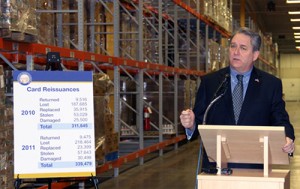Ohio’s minimum wage is scheduled to increase on January 1, 2013 to $7.85 per hour for non-tipped employees and to $3.93 per hour for tipped employees, plus tips.
The 2012 Ohio minimum wage is $7.70 per hour for non-tipped employees and $3.85 for tipped employees, plus tips.
On January 1, 2013, the increased minimum wage will apply to employees of businesses with annual gross receipts of more than $288,000 per year. The 2012 Ohio minimum wage applies to employees of businesses with annual gross receipts of more than $283,000 per year.
The Constitutional Amendment passed by Ohio voters in November 2006 states that Ohio’s minimum wage shall increase on January 1 of each year by the rate of inflation. The state minimum wage is tied to the Consumer Price Index (CPI) for urban wage earners and clerical workers for the 12-month period prior to September. This CPI index rose 1.7 percent from September 1, 2011 to August 31, 2012. The Amendment also states that the wage rate for non-tipped employees shall be rounded to the nearest five cents.
How will this raise effect the economic well-being of minimum wage workers? A full-time employee working 40 hours a week 52 weeks a year made a whopping $16,016 before taxes. This same Ohioan will make an earth-shaking $312 a year more with the upcoming raise. Let’s assume this same employee is a single parent raising one child.
Before the proposed raise, this single parent’s after-tax income is $11,797 and with the raise, it will be $12,046. Our single parent has reason to celebrate because he/she will have $249 more spending money. Right? Well, not exactly. Before we can determine how much spending money our single parent actual has, we have to deduct the social security and Medicare deductions. Therefore, our single parent’s yearly take-home pay before the proposed raise actually is $10,564, and after the raise, it will be $10,789. Now, our single only has $225 more for consumption. Just for perspective, the poverty line for our single parent is $15,130. Even if our hypothetical single parent get all income tax dollars back at the end of the year, he or she will still be living in poverty throughout most of the year.
Consequently, minimum wage is not a minimal living income. It is a pay scale to enhance welfare benefits to a livable standard.
It only gets worse for employees at smaller companies (with annual gross receipts of $283,000 or less per year in 2012 or $288,000 or less per year after January 1, 2013) and for 14- and 15-year-olds, the state minimum wage is $7.25 per hour. For those employees, the state wage is tied to the federal minimum wage of $7.25 per hour which requires an act of Congress and the President’s signature to change.

 Auditor of State Dave Yost this week identified substantial risks of fraud in Ohio’s food stamp program.
Auditor of State Dave Yost this week identified substantial risks of fraud in Ohio’s food stamp program.